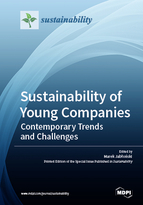Sustainability of Young Companies–Contemporary Trends and Challenges
A special issue of Sustainability (ISSN 2071-1050).
Deadline for manuscript submissions: closed (30 June 2019) | Viewed by 69238
Special Issue Editor
Interests: sustainability; business models; strategic performance management; value-based management; development of companies; strategy
Special Issue Information
Dear Colleagues,
Ensuring the sustainability of early stage companies, and increasing awareness of the need for balancing targets against different stakeholder groups among young companies, are not well developed. Young companies, in the first place, want to achieve financial success very often without regard to aspects such as the environment, positive relationships with employees suppliers or other stakeholder groups, fulfill requirements of labor law and other. Another issue is that of companies of which business models are based on actuarially-preferred concepts, such as sharing economy, sustainable development, e-comers, e-commerce, renewable energy, social media, and others. A key issue is the resignation of companies from an approach to business, based on the foundations of classical economics to the sharing economy. Theory and practice seek new solutions in the sphere of value sharing in this new areas of sharing, and innovative forms of its implementation. Intriguing is the relationship of these business models with sustainability issues. Also is wondering how technology can influence for sustainability. Contemporary approach to consumer value fits in with the assumption of shared economy. It is interesting how it affects for the assumptions of sustainability of business. The ongoing changes in the value system of potential consumers create new conditions for designing of sustainability business models and creating of innovation. On the basis of the above-mentioned assumptions, the key issue is to answer the following questions:
- Why is the problem of sustainability of young companies.
- How to designee a sustainable business models?
- What are the features of sustainable business models companies in early stage of development?
- How create a sustainable start-ups?
- Why the business models of young companies are unstable?
- Is a connection between agility, flexibility, scalability and sustainability of business models in context of small and young companies?
- How to designee a methodic for creating of sustainable business models.
- What are the difference between sustainability for big companies and small companies?
- What is the rules of stakeholders in shaping of sustainability of young companies?
Prof. Dr. Marek Jabłoński
Guest Editor
Manuscript Submission Information
Manuscripts should be submitted online at www.mdpi.com by registering and logging in to this website. Once you are registered, click here to go to the submission form. Manuscripts can be submitted until the deadline. All submissions that pass pre-check are peer-reviewed. Accepted papers will be published continuously in the journal (as soon as accepted) and will be listed together on the special issue website. Research articles, review articles as well as short communications are invited. For planned papers, a title and short abstract (about 100 words) can be sent to the Editorial Office for announcement on this website.
Submitted manuscripts should not have been published previously, nor be under consideration for publication elsewhere (except conference proceedings papers). All manuscripts are thoroughly refereed through a single-blind peer-review process. A guide for authors and other relevant information for submission of manuscripts is available on the Instructions for Authors page. Sustainability is an international peer-reviewed open access semimonthly journal published by MDPI.
Please visit the Instructions for Authors page before submitting a manuscript. The Article Processing Charge (APC) for publication in this open access journal is 2400 CHF (Swiss Francs). Submitted papers should be well formatted and use good English. Authors may use MDPI's English editing service prior to publication or during author revisions.
Keywords
- young companies
- sustainability
- sharing economy
- technology business model
- early stage of development
- sustainable business model
- creating of shareholder value
- start-ups
- flexibility of business models
- agility of business models






